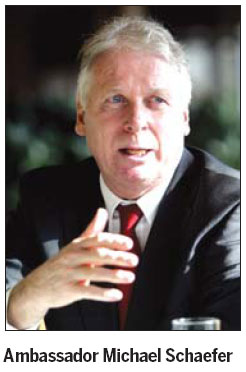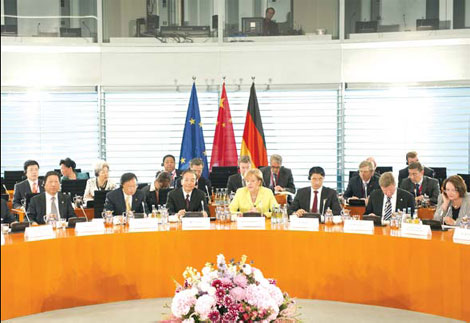Strong Sino-German ties mark 40th anniversary
Updated: 2012-02-02 07:50
By Zhang Zhao and Xu Xiao (China Daily)
|
|||||||||||
|
Premier Wen Jiabao and Chancellor Merkel at the first-ever Sino-German intergovernmental consultations last year in Berlin. [Huang Jingwen / Xinhua] |
China's biggest trade links with Europe, ally in science, culture and education
Editor's note: Michael Schaefer, German Ambassador to China, talked about bilateral cooperation prior to German Chancellor Angela Merkel's arrival in China today:
Q: This year marks the 40th anniversary of diplomatic relations between Germany and China. What have been the major achievements in bilateral cooperation?
A: Forty years ago, when German Foreign Minister Walter Scheel and Chinese Foreign Minister Ji Pengfei signed the agreement to establish diplomatic relations, our world was a different one. Europe was in the midst of the Cold War, Germany was divided and China was going through the turmoil of the cultural revolution.
Since then, China has undergone breathtaking development and found its place back among the leading nations of the world. Germany is reunited and a stabilizing power in Europe.
What could not have been perceived in 1972 is that China and Germany have since become close political partners. And they are for each other the most important economic partners in Asia and Europe. Our cultural, scientific and academic relations are dynamic and rich. In our globalized world our two nations are working together closely in tackling common challenges.
During the first Sino-German intergovernmental consultations held in Berlin in June 2011, we have agreed to focus our strategic partnership on key challenges like energy, environment and climate.
Our rule of law dialog, including open exchange on human rights, as well as people-to-people contacts, are of increasing importance. Such exchanges have enhanced our mutual understanding and built trust between our two people.
The past 40 years of Chinese-German relations have been a success story. We are looking forward to the visit of Chancellor Angela Merkel in China to mark the beginning of the anniversary year. I am confident that her visit will open the door for ever more successful cooperation in all fields.
 |
Q: Many German companies are investing in China and many Chinese companies are present in the German market. What are their roles in strengthening economic ties?
A: Large companies as well as countless small and medium-sized enterprises are well established in the Chinese market. Compared with our investment in China, which now totals approximate 21 billion euros ($27.6 billion), Chinese investment in Germany is still small at around 600 million euros. There are yet vast chances in the German market for profitable and technologically attractive investment.
In an increasingly globalized economy, foreign direct investment is mutually beneficial to stabilize economic relations. That is why Chancellor Merkel and the German government have reiterated that Chinese investment is most welcome in Germany and Europe as a whole.
Increased investment in both directions will further boost our bilateral trade. It will create jobs in both labor markets and contribute to sustainable growth. Many of our enterprises are ready to transfer know-how and technology, yet such transfer must remain voluntary. Likewise, market access must be fair and transparent.
Q: What do you think about China's role in helping relieve the European debt crisis?
A: In the first place, the current European debt crisis must and shall be resolved by Europe itself. Every EU member concerned has to do its homework to solve its sovereign debt problems through swift and efficient structural reforms.
The European Council meetings in December and January have taken the right decisions towards a fiscal union, addressing the current shortcomings of a joint economic and fiscal policy in the EU. We need more Europe, not less Europe.
As the strongest economy in Europe, Germany is standing up to its responsibility to resolve the crisis. At Davos last week, Chancellor Merkel highlighted three key requirements: reliability, solidarity, and structural reforms. By implementing them, the euro will regain trust among citizens and markets.
China can do its part to show trust and confidence in the euro - also as an international reserve currency. Chinese investments in Europe, as the largest single market globally, are welcome. I am convinced that China's engagement in Europe will increase.
Q: 2012 is the "Chinese Culture Year in Germany". What are your thoughts on cultural ties between the two countries? What events are planned in the future?
A: From 2007 to 2010, Germany introduced a new format of cooperation through the "Germany and China - Moving Ahead Together" program. Under the overall theme of "sustainable urban development" and together with our Chinese partners in six provinces, we have organized numerous cultural events and hundreds of conferences and seminars bringing together experts from both countries. Millions of Chinese attended these events.
Another spectacular highlight is the first foreign art exhibition at the new National Museum of China. Famous state collections from Berlin, Dresden and Munich are presenting "The Art of Enlightenment". The unprecedented art show has attracted more than 300,000 visitors so far.
The exhibition is accompanied by a series of dialog fora and salons on topics related to the theme of enlightenment and to challenges of our modern societies. In view of the great success of this program, we expect the dialog series to continue after the conclusion of the exhibition.
A very important field of cultural exchange is people-to-people contacts. More than 30,000 Chinese students now study in German universities, and an increasing number of young Germans study or work in China.
This year, we will start a very exciting project, the "German-Chinese Future Bridge". It is our intention to bring together in the next decade "the best of the best" among young professionals and future leaders.
The fifth German consulate in China, which will open in Liaoning province later this year, will help to enhance our cultural presence in Northeast China.
The actual 40th anniversary celebrations in Beijing in October will be accompanied by high-ranking political visits, cultural highlights and a citizens festival.
Q: Do you have any other topics to share with our readers?
A: I would like to encourage your young readers to get connected with Germany - either through our embassy websites or microblogs, or even better, by visiting our country. The breathtaking landscapes from sea to high mountains; old, historic cities and modern architecture; our capital Berlin with the most exciting art scene in Europe; Dresden with its stunning castles and galleries; or elegant Munich with its world famous beer gardens will certainly meet the highest expectations of anybody.
The China Cultural Year in Germany has just started - a good excuse for many of you to get first hand German experience. I promise, you won't regret it.
Today's Top News
President Xi confident in recovery from quake
H7N9 update: 104 cases, 21 deaths
Telecom workers restore links
Coal mine blast kills 18 in Jilin
Intl scholarship puts China on the map
More bird flu patients discharged
Gold loses sheen, but still a safe bet
US 'turns blind eye to human rights'
Hot Topics
Lunar probe , China growth forecasts, Emission rules get tougher, China seen through 'colored lens', International board,
Editor's Picks

|

|

|

|

|

|






